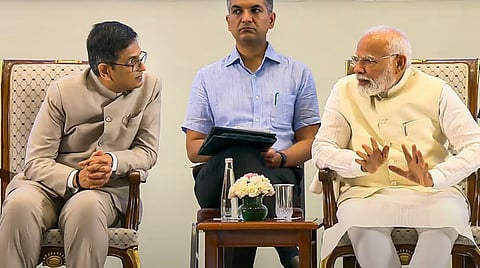

NEW DELHI: Prime Minister Narendra Modi Saturday underlined the need for swift justice in cases involving crimes against women and said that it will give them greater assurance of their safety.
Modi also said the judiciary is considered a guardian of the Constitution, and that the Supreme Court and the judiciary have lived up to the responsibility.
Addressing the inaugural session of a national conference of the district judiciary in the presence of Chief Justice of India D Y Chandrachud, Modi said the people of India have never shown any distrust of the Supreme Court or the judiciary.
On matters of national security, Modi said, the judiciary has protected national integrity by keeping national interests paramount.
Against the backdrop of the alleged rape and murder of a doctor in Kolkata and the sexual assault on two kindergarten girls in Thane, he said atrocities against women and the safety of children were matters of grave concern for society.
"The faster justice is delivered in cases of atrocities against women, the greater assurance half of the population will have about their safety," the prime minister said.
Modi said there were several stringent laws to deal with crimes against women and there was a need to ensure better coordination among the criminal justice system to ensure swift justice.
Speaking at the event, Chief Justice of India (CJI) D Y Chandrachud termed the district judiciary the "backbone of the judiciary" and said it is a crucial component of the rule of law. He pointed out it was necessary to stop calling district judiciary subordinate.
"The district judiciary is the first point of contact for a citizen in search of justice. The district judiciary is a crucial component of the rule of law," Justice Chandrachud said.
He said the quality of work and the conditions in which the judiciary provides justice to citizens determine whether they have confidence in the judicial system.
"The district judiciary is therefore called upon to shoulder tremendous responsibility and is aptly described as the 'backbone of the judiciary'. The spine is the core of the nervous system," the CJI said.
"To sustain the spine of the legal system, we must stop calling the district judiciary as the subordinate judiciary. Seventy-five years after Independence, the time has come for us to bury one more relic of the British era the colonial mindset of subordination," he added.
The CJI said that in 2023-2024, 46.48 crore pages of court records have been scanned or digitised.
"The National Judicial Data Grid, managed by the e-committee in conjunction with the National Informatics Centre, is a mine of data not only for lawyers but also for citizens," he said.
Justice Chandrachud said the e-courts project has also been responsible for the computerisation of over 3,500 court complexes and more than 22,000 courtrooms.
"The district judiciary has played a crucial role in deploying technology in day-to-day affairs: district courts in the country have heard 2.3 crore cases through video conference," he said.
The CJI said judgments of the Supreme Court were being translated into every language recognised by the Constitution and 73,000 translated verdicts were in the public realm.
Referring to data on the changing demography of the judiciary, he said an increasing number of women have been joining the district judiciary in the past few years.
"Women consisted of 58 per cent of the total recruitment for civil judges in Rajasthan in 2023. Sixty-six per cent of the judicial officers appointed in Delhi in 2023 were women. In Uttar Pradesh, 54 per cent of the appointments for civil judges (junior division) in the batch of 2022 were women," he said.
Justice Chandrachud also said that in Kerala, 72 per cent of the total number of judicial officers are women.
"These are a few examples which paint the picture of a promising judiciary of the future," he said.
Besides the CJI, Modi, Union Law Minister Arjun Ram Meghwal, Supreme Court Justice Sanjiv Khanna, Attorney General R Venkataramani, Supreme Court Bar Association president Kapil Sibal and Bar Council of India Chairman Manan Kumar Mishra also addressed the gathering.
The two-day function is being organised by the Supreme Court.
President Droupadi Murmu will deliver the valedictory address on September 1 and will also unveil the flag and insignia of the Supreme Court, a statement issued by the apex court on Friday said.